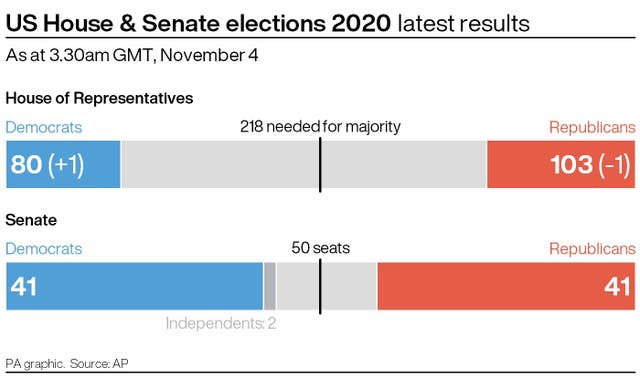
Ben Kentish 10pm - 1am
4 November 2020, 05:34

Democrat Debbie Mucarsel-Powell became the first incumbent in the House to lose on polling day, falling to Miami-Dade County mayor Carlos Gimenez.
Republicans have picked up a seat in Florida but lost two in North Carolina as Democrats aimed to cement their control of the House of Representatives.
Democrat Debbie Mucarsel-Powell became the first incumbent in the House to lose on polling day, falling to Miami-Dade County mayor Carlos Gimenez in a South Florida district that US President Donald Trump lost decisively in 2016.
The race saw the two sides spend more than 26 million US dollars, making it one of the country’s most expensive, and seemed to reflect Mr Trump’s strength this year among Cuban voters.
Even so, Democrats as expected, captured two North Carolina seats vacated after Republican incumbents retired following a court-ordered remapping, which made the district more Democratic.
And public anxiety over the pandemic, Mr Trump’s alienation of suburban voters and a vast fundraising edge fuelled Democratic hopes that they had not only retained their House majority but could make it larger.
In one noteworthy but unsurprising finish, Marjorie Taylor Greene, who has espoused unfounded QAnon conspiracy theories, won a vacant seat in north-west Georgia.
Ms Greene, whom Mr Trump has called a “future Republican star”, has alleged an “Islamic invasion” of government offices and expressed other racist views. QAnon asserts that Mr Trump is quietly waging a battle against paedophiles in the federal bureaucracy and Democratic Party. Ms Greene has since backtracked from her embrace of QAnon.

Elsewhere, progressive star Alexandria Ocasio-Cortez was re-elected from her New York City district. And both parties’ number three House leaders, Democrat James Clyburn of South Carolina and Republican Liz Cheney of Wyoming, won their contests easily.
The night’s initial returns offered few surprises, with the scores of both parties’ incumbents from safe districts easily re-elected. But dozens of hotly fought races remained undecided into the evening.
Republicans were hoping to oust some of the 29 Democrats in districts Mr Trump won in 2016 in districts ranging from upstate New York to rural New Mexico.
But nearly all Democratic incumbents in potentially vulnerable districts were outspending their Republican challengers, often by vast margins. Democrats were also aiming millions at Republican-held seats from suburbs in Georgia, Texas and Indiana and even Republican strongholds like Little Rock, Arkansas, western Colorado and Alaska.

Both parties’ operatives agreed that the Republican Party was mostly playing defence and would be fortunate to limit Democratic gains to modest single digits. Democrats control the House by 232-197, with five open seats and one independent. It takes 218 seats to control the chamber.
The coronavirus pandemic and the wounded economy, which voters ranked as top concerns according to AP VoteCast, a national survey of the electorate, hang over the election. The virus has killed 232,000 people in the US and cases are rising in nearly every state, while millions have lost jobs.
Should Democrat Joe Biden defeat Mr Trump and Democrats win the Senate majority, the party would fully control the White House and Congress for only the second time since 1995. They last held the presidency, Senate and House in 2009 and 2010, the first two years of Barack Obama’s presidency.
A larger Democratic majority would make it easier for House speaker Nancy Pelosi to pass party priorities that include expanding healthcare coverage and creating jobs with new infrastructure projects. After a two-year run as one of her party’s most effective counterpoints to Mr Trump, the 80-year-old Ms Pelosi is all but certain to serve two more years running the House.